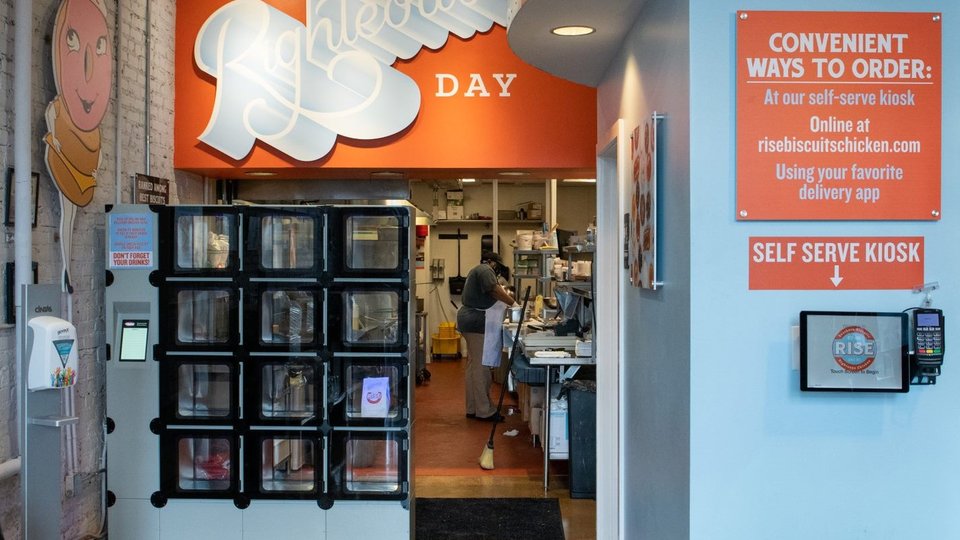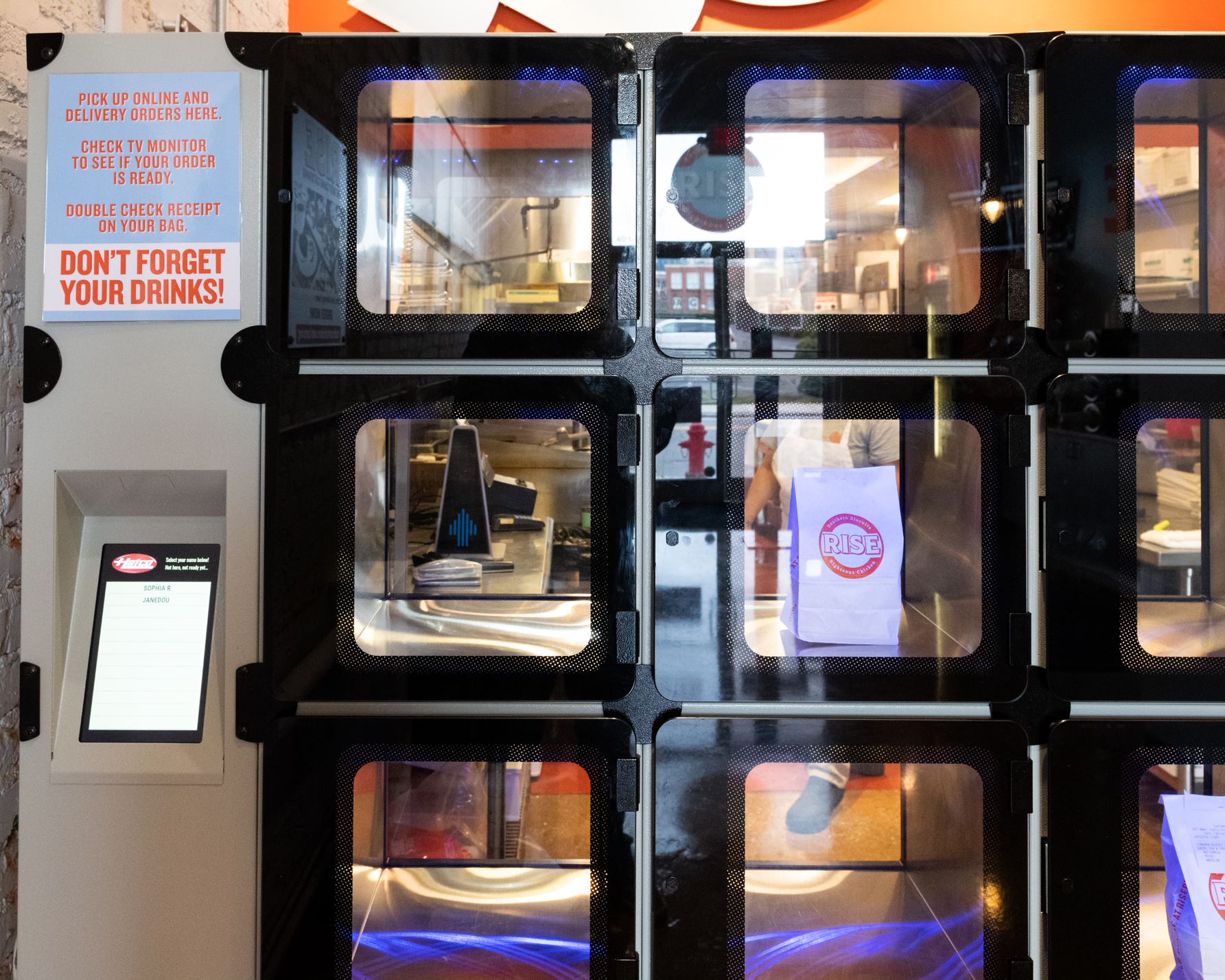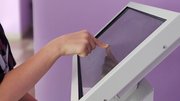Restaurants
Self-ordering positions Rise Southern Biscuits for success amid pandemic
Self-service kiosks and online ordering have proven especially helpful to Rise Southern Biscuits and Righteous Chicken during the coronavirus pandemic.

March 17, 2021 by Elliot Maras — Editor, Kiosk Marketplace & Vending Times
In retrospect, Rise Southern Biscuits and Righteous Chicken picked a good time to invest in a versatile POS provider in 2014.
That provider, Revel Systems, has allowed the Durham, North Carolina based chain to expand into self-service kiosks and online ordering, which have proven particularly beneficial during the coronavirus pandemic.
 |
| A customer places an order on an iPad. |
"It's definitely helped us (during the pandemic) without a hitch," Ken Priest, CFO and co-owner, told Kiosk Marketplace in a phone interview.
In search of efficiency
When the partners were exploring POS systems in 2014, they did not anticipate a COVID-19 situation that would require them to close in-store dining. The company had been in business for two years and was looking for a system that would support a "plug and play" offering for franchisees.
"Our goal was to get as automated as possible in our realm, and that was embracing as much technology as we could," Priest said.
Revel Systems offered a kitchen display system in addition to POS, which was a crucial consideration, said Priest.
"It increased our efficiency in the kitchen tremendously," Priest said.
In 2015, Rise deployed a self-order iPad in addition to its two cash registers in its store.
"We always start everything in the corporate stores to prove that it can work before we make our franchisees do something," Priest said.
Initial customer response slow
The team had hoped the regular customers, who knew the menu, would choose to use the kiosk, but only about 5% of the customers used it when it was introduced.
"We were early to the party with that," Priest said. Not a lot of people knew what the iPad was for.
Customers were also slow to accept third-party online ordering, which Rise also introduced in 2015.
As time progressed, however, so did customers' acceptance of self-service. Priest credited McDonald's and Amazon for improving customer acceptance of self-service.
Kiosk and online orders take over
By 2018, kiosks and third-party online orders accounted for 80% of the orders, even though there were still two attended registers in the stores. Of that 80%, kiosk was first, third-party delivery was second and online ordering third.
"We needed to make a change," Priest said. "It's hard for us to justify having register people being there for 20% of the orders."
They then added another kiosk and removed one of the two manned registers. This did not impact the sales, and it eventually proved more profitable. For the first three months, an employee was on hand during busy periods to help the customers with the kiosks.
"We spent a ton of money educating," Priest said.
As franchisees came on board, they were required to have a self-order iPad in addition to the manned registers. Franchisees were okay with it since the expense was not great, Priest said.
Rise has since moved the kiosks to the front and center of the store, added a customer loyalty program, launched a digital gift card and introduced its own online ordering, all managed by the Revel software.
"That is one of the attractions of using all of Revel services; everything talks together," Priest said.
Customers can now pay at the kiosk and online using the loyalty points. If someone wants to pay with cash, they can.
There are now at least two kiosks in every store and counter clerks are being removed completely.
"We don't take orders any more in the corporate stores," Priest said.
During the pandemic, the gift cards have been especially popular. "We've had a lot of people ask for digital gift cards in these trying times," he said.
 |
| More recently, the company has introduced heated pickup lockers. |
New entrant: pickup lockers
More recently, the company introduced a heated locker system at its Durham location to keep pickup orders hot and fresh while reducing customer and employee interaction.
"The lockers are glass cubicles stacked on top of one another, each equipped with its own heating system to keep food piping hot, even if you pick up your order an hour after it was made," Tom Ferguson, founder and CEO, said in a prepared statement.
The lockers have led to an increase in business.
"Most importantly, I attribute this increase to the ease of usage and knowing your order will be ready and hot when you come to get it," he said.
Meanwhile, business continues to improve and is currently ahead of where it was last year at this time.
Four weeks after the coronavirus hit, sales recovered to pre-COVID numbers, Priest said, and no Rise restaurants had to close as a result of the pandemic.
Although he couldn't comment on the overall cost of the technology rollouts implemented since 2014, Ferguson said they've been well worth the investment as the business continues to improve, and sales are ahead of where they were last year at this time.
There are currently eight stores in North Carolina, two in Maryland, two in Tennessee, one in Virginia, one in Oklahoma, one in Georgia, one in Kansas and one in development in Los Angeles, according to the company website.
For an update on how the coronavirus pandemic is affecting kiosks, click here.
Pictures courtesy of Revel Systems.
About Elliot Maras
Elliot Maras is the editor of Kiosk Marketplace and Vending Times. He brings three decades covering unattended retail and commercial foodservice.
 ChatGPT
ChatGPT Grok
Grok Perplexity
Perplexity Claude
Claude









